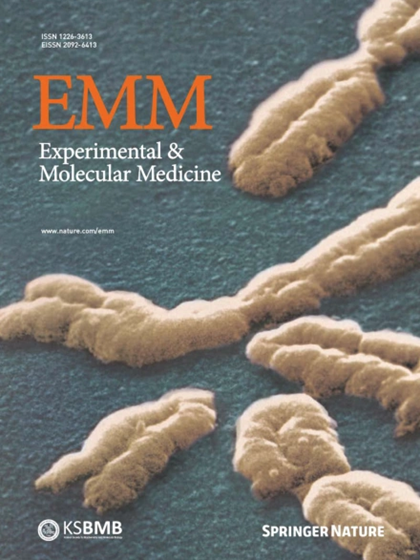ACOT12是肾纤维化发病机制中的一个新因子,可调节ACBD5。
IF 9.5
2区 医学
Q1 BIOCHEMISTRY & MOLECULAR BIOLOGY
引用次数: 0
摘要
脂质代谢,特别是脂肪酸氧化功能障碍,是肾纤维化的主要驱动因素。然而,这一过程背后的详细监管机制尚不清楚。在这里,我们证明了酰基辅酶a硫酯酶12 (Acot12),一种参与酰基辅酶a硫酯水解成游离脂肪酸和辅酶a的酶,是纤维化肾脏脂质代谢的关键调节剂。在人类慢性肾病患者的肾脏样本以及肾损伤小鼠的肾脏样本中观察到ACOT12水平显著降低。Acot12缺乏可诱导单侧输尿管梗阻(UUO)小鼠脂质积累和纤维化。非诺贝特不能减轻Acot12-/- UUO小鼠的肾纤维化。此外,在UUO患者的Acot12-/- PPARα -/-肾脏中,过氧化物酶体增殖物激活受体α (PPARα)的恢复加剧了脂质积累和肾脏纤维化,而在UUO患者的Acot12-/- PPARα -/-肾脏中,Acot12的恢复显著减少了脂质积累和肾脏纤维化,这表明,在机制上,Acot12缺乏加剧了肾纤维化,而不依赖于PPARα。在患有UUO的Acot12-/-肾脏中,观察到过氧化物酶体的选择性自噬降解和噬噬随着ACBD5水平的降低而减少。总之,我们的研究证明了Acot12在肾纤维化进展中的功能作用和机制细节,为调节Acot12表达提供了临床前依据,并提出了一种预防肾纤维化的新方法。本文章由计算机程序翻译,如有差异,请以英文原文为准。

ACOT12, a novel factor in the pathogenesis of kidney fibrosis, modulates ACBD5
Lipid metabolism, particularly fatty acid oxidation dysfunction, is a major driver of renal fibrosis. However, the detailed regulatory mechanisms underlying this process remain unclear. Here we demonstrated that acyl-CoA thioesterase 12 (Acot12), an enzyme involved in the hydrolysis of acyl-CoA thioesters into free fatty acids and CoA, is a key regulator of lipid metabolism in fibrotic kidneys. A significantly decreased level of ACOT12 was observed in kidney samples from human patients with chronic kidney disease as well as in samples from mice with kidney injuries. Acot12 deficiency induces lipid accumulation and fibrosis in mice subjected to unilateral ureteral obstruction (UUO). Fenofibrate administration does not reduce renal fibrosis in Acot12−/− mice with UUO. Moreover, the restoration of peroxisome proliferator-activated receptor α (PPARα) in Acot12−/−Pparα−/− kidneys with UUO exacerbated lipid accumulation and renal fibrosis, whereas the restoration of Acot12 in Acot12−/− Pparα−/− kidneys with UUO significantly reduced lipid accumulation and renal fibrosis, suggesting that, mechanistically, Acot12 deficiency exacerbates renal fibrosis independently of PPARα. In Acot12−/− kidneys with UUO, a reduction in the selective autophagic degradation of peroxisomes and pexophagy with a decreased level of ACBD5 was observed. In conclusion, our study demonstrates the functional role and mechanistic details of Acot12 in the progression of renal fibrosis, provides a preclinical rationale for regulating Acot12 expression and presents a novel means of preventing renal fibrosis. Chronic kidney disease (CKD) is a serious condition that affects kidney function over time. It can lead to other health problems, but current treatments are limited. Here the authors wanted to explore new ways to treat CKD by focusing on kidney fibrosis, a major factor in CKD progression. This study demonstrates that decreased level of ACOT12, a critical enzyme in lipid metabolism, correlates with increased fibrosis and lipid accumulation in the kidney tissues. Mice lacking ACOT12 had more kidney fibrosis and lipid accumulation, suggesting that ACOT12 plays a protective role, while restoring ACOT12 in these mice reduced fibrosis and lipid buildup. These findings suggest that targeting ACOT12 could be a novel therapeutic approach for preventing kidney fibrosis by regulating lipid metabolism in CKD. This summary was initially drafted using artificial intelligence, then revised and fact-checked by the author.
求助全文
通过发布文献求助,成功后即可免费获取论文全文。
去求助
来源期刊

Experimental and Molecular Medicine
医学-生化与分子生物学
CiteScore
19.50
自引率
0.80%
发文量
166
审稿时长
3 months
期刊介绍:
Experimental & Molecular Medicine (EMM) stands as Korea's pioneering biochemistry journal, established in 1964 and rejuvenated in 1996 as an Open Access, fully peer-reviewed international journal. Dedicated to advancing translational research and showcasing recent breakthroughs in the biomedical realm, EMM invites submissions encompassing genetic, molecular, and cellular studies of human physiology and diseases. Emphasizing the correlation between experimental and translational research and enhanced clinical benefits, the journal actively encourages contributions employing specific molecular tools. Welcoming studies that bridge basic discoveries with clinical relevance, alongside articles demonstrating clear in vivo significance and novelty, Experimental & Molecular Medicine proudly serves as an open-access, online-only repository of cutting-edge medical research.
 求助内容:
求助内容: 应助结果提醒方式:
应助结果提醒方式:


